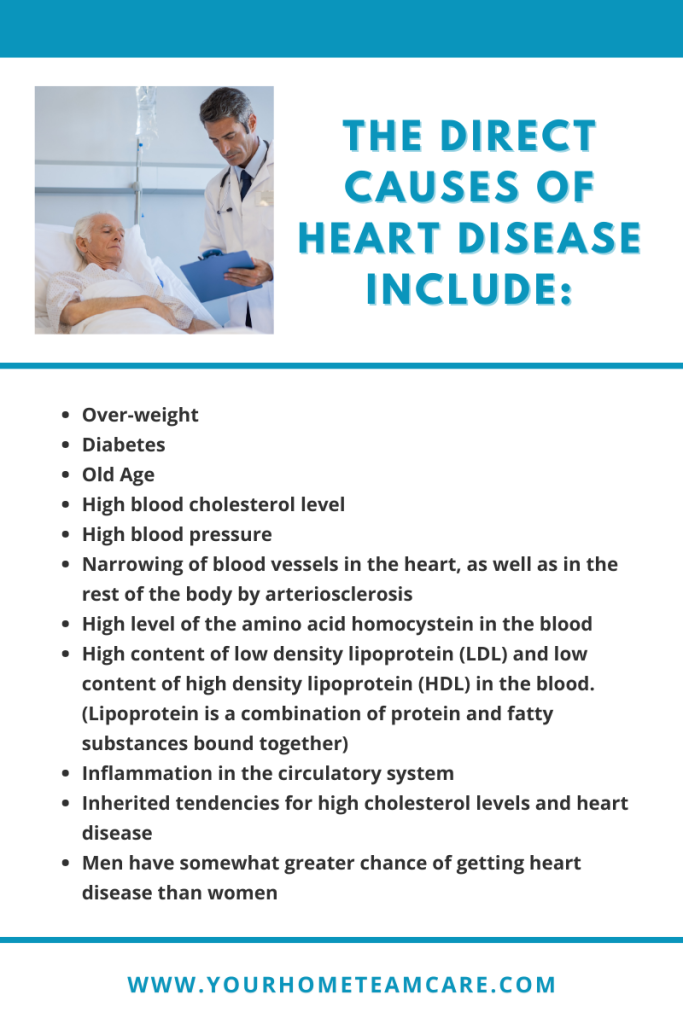Heart disease kills countless people in America year after year. There are steps you can take to prevent heart disease and heart attacks.
There are many factors that can affect your health and that directly causes heart disease. Some of these factors can be prevented, while others may be genetic, or caused by underlying illnesses and health problems. Heart attacks and coronary heart disease can be prevented by making healthier lifestyle choices. Before we talk about the best ways to prevent heart disease, let’s take a look at what causes it.

The risk factors for heart disease are connected in intricate ways. Let’s take arteriosclerosis as an example. Arteriosclerosis causes high blood pressure, and high blood pressure causes even more arteriosclerosis. Many heart disease risk factors can be caused or triggered by the following lifestyle factors:
- A high consumption of cholesterol, fat & sugar
- Consuming the wrong type of fats
- A Lack of fiber, minerals, vitamins, as well as other diet deficiencies
- Having a stressful life and a stressful job
- Smoking
- Not getting any exercise
By making the right lifestyle adjustments, you can prevent heart attacks and other heart problems.
When it comes to your health, having the proper diet in place should be your top priority. Making healthier eating choices can prevent a lot of diseases including heart disease and cancer. Let’s take a look at some healthy foods you can start implementing in your diet today:
- Try to avoid eating processed foods, as well as fried greasy foods
- Try adding more fish (seafood) to your diet. Eating fish a few times each week is very beneficial to your body
- Avoid consuming too much red meat
- Eat raw fruits and vegetables daily. Eating them raw helps to keep all of the nutrients which is what your body needs
- Try to include corn bread, corn cereals, beans, potatoes and peas in your diet
- Eating too much fatty foods is unhealthy, so try to only consume a small amount
- Foods that are rich in cholesterol should be eaten in moderation ( egg, liver)
- Mono-unsaturated fat is the type of fat you need to consume. You should also eat foods that have poly-unsaturated which are rich in omega-3, and omega 6.
- When cooking remember that coconut oil, palm oil and butter should be used in moderation because they contain high amounts of saturated fats
- Avoid eating fast food, margarine, as well as pre-made food and snacks that contain trans-fat (which is chemically altered)
- Things like sugar, refined cereals and refined flour should be eaten in moderation
- Things like alcohol and caffeine should be consumed in moderation or cut from your diet completely depending on your current health status
- Salt should also be used in moderation when cooking

Did you know that taking dietary supplements can help reduce your risk of heart disease? According to the Heart Foundation, The following dietary supplements holds some benefits to heart health:
- **Fish oil is also known as omega-3. You may see the two most common types of omega-3 on the label: Docosahexaenoic acid (DHA) or Eicosapentaenoic acid (EPA). There is good evidence to show that a fish oil supplement (containing EPA and DHA) reduces triglycerides by about 15%4. This is good because triglycerides are a type of fat in your blood and having high triglyceride levels increases your risk of heart attack and stroke. The recommended level of triglyceride in your blood is less than 1.7mmol/L.
- **Coenzyme Q10 (CoQ10) is an antioxidant made by the body. It can also be bought as a supplement. Some studies show that heart disease is connected to a not having enough CoQ10. But it’s hard to tell whether CoQ10 deficiency is the cause or result of heart disease. Coenzyme Q10 is also known as CoQ10, vitamin Q10, Ubiquinone, and Ubidecarenone.
- **Plant sterols: There are low levels of plant sterols in fruits, vegetables, nuts, and cereals. Some foods like margarine have plant sterols added to them and you can also buy them as supplements. Plant sterols are also known as plant phytosterols. Plant sterols may be best for people trying to lower their cholesterol. They should be taken as part of a heart-healthy diet with healthy fats, whole grains, vegetables, fruit, legumes, nuts and seeds.
**The previous information on dietary supplements was sourced from https://www.heartfoundation.org.nz/about-us/news/blogs/dietary-supplements-and-heart-health – Be sure to speak with your doctor before adding any supplements into your diet.
Some other ways you can make healthier choices in order to prevent heart disease include:
- Managing your weight. Being overweight has negative effects on your health and your heart. It’s important to maintain a healthy weight no matter your age
- Exercise should be a part of your lifestyle. Being physically active on a regular basis helps to strengthen your body and is good for your cardiovascular system. It also helps to keep unnecessary weight off, therefore keeping you at a healthy weight. Exercises like walking, jogging, strength training, swimming/aerobic exercises and tai-chi are great for a healthy heart.
- If you smoke, you should seek help so that you can quit smoking, smoking greatly increases your risk of heart disease
- For people who are at a higher risk of heart attacks, aspirin can be helpful. It is important to note that, aspirin does increase your risk of bleeding because it is a blood thinner. Aspirin should only be used if prescribed by your doctor.
The following sources were used to provide accurate statistics and information for this blog post:
1. https://www.cdc.gov/heartdisease/facts.htm
2. https://www.heartfoundation.org.nz/about-us/news/blogs/dietary-supplements-and-heart-health

